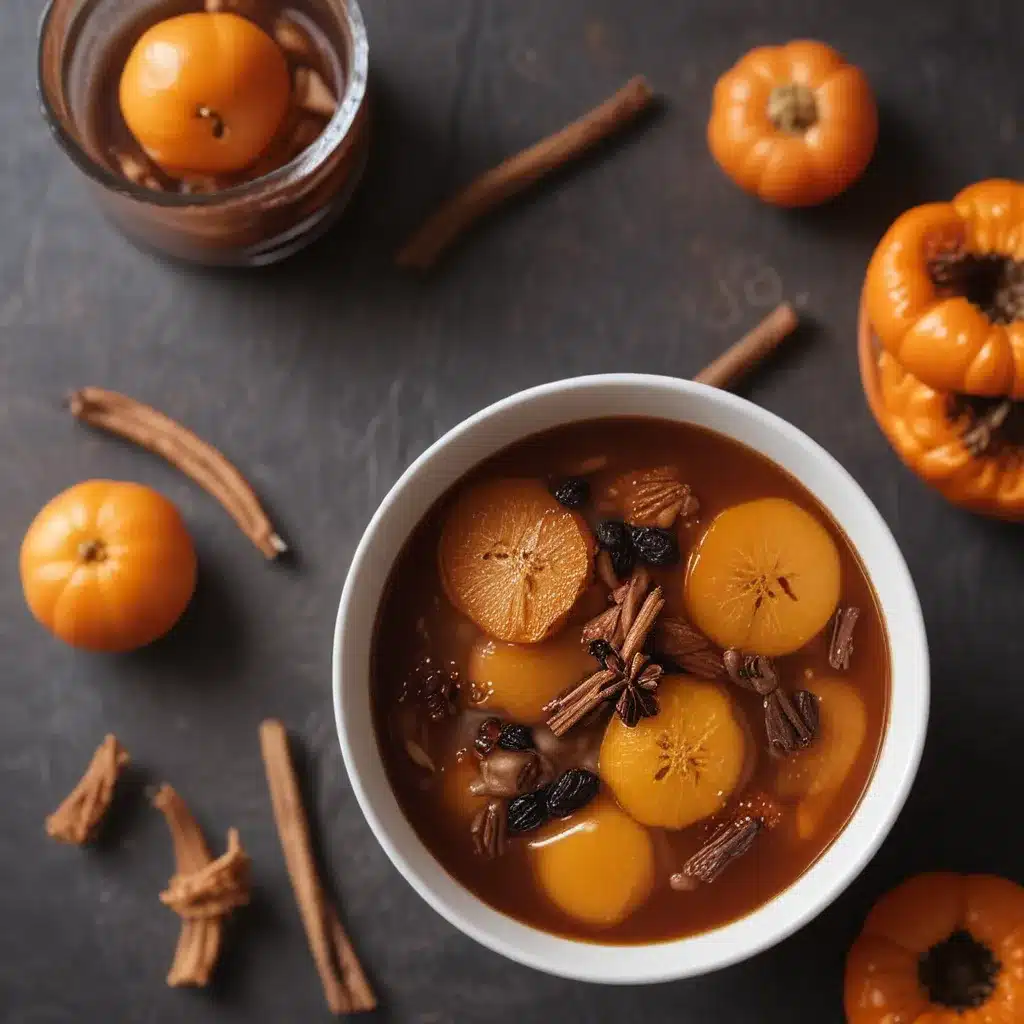
The Intoxicating Aroma of Sujeonggwa
As I step into the bustling kitchen of Korean Garden, the scent of warm cinnamon and fragrant persimmons immediately envelops me. This can only mean one thing – the renowned sujeonggwa, a traditional Korean punch, is being meticulously prepared. I can’t help but feel a tinge of excitement, for sujeonggwa holds a special place in the hearts of both Koreans and those who have been fortunate enough to discover its delights.
You see, sujeonggwa is not just a simple drink – it’s a cultural touchstone, a soothing elixir that has been passed down through generations. Its origins can be traced back to the Joseon dynasty, when it was often served during the Chuseok harvest festival as a way to celebrate the bountiful autumn season.
But what exactly is sujeonggwa, you ask? Well, let me tell you a story…
The Captivating History of Sujeonggwa
Picture this: it’s a chilly autumn evening, and you’re gathered with your family around a crackling fire, sipping on a warm, fragrant beverage. The steam swirls around you, and the rich, cinnamony aroma fills the air, instantly transporting you to a bygone era.
This is the essence of sujeonggwa – a traditional Korean punch made with dried persimmons, cinnamon, and a touch of honey or sugar. The dried persimmons, locally known as gotgam, lend a natural sweetness and a distinct, almost apricot-like flavor to the drink. The cinnamon, on the other hand, imparts a warmth and spiciness that perfectly complements the persimmons.
But sujeonggwa is more than just a delicious drink – it’s a reflection of Korean culture and history. During the Joseon dynasty, it was often served as a ceremonial beverage, used in rituals and celebrations. The dried persimmons, which were abundant in the region, were seen as a symbol of prosperity and good fortune, making sujeonggwa the perfect accompaniment to important events.
The Art of Brewing Sujeonggwa
Now, as I stand in the kitchen of Korean Garden, I can’t help but marvel at the intricate process of making this captivating elixir. It’s a true labor of love, requiring patience, precision, and a deep understanding of the flavors at play.
The first step is to source the highest-quality ingredients. At Korean Garden, they work closely with local farmers and artisans to ensure that the dried persimmons and cinnamon sticks used in their sujeonggwa are of the utmost quality. These carefully selected ingredients are then meticulously prepared, with the dried persimmons being meticulously cleaned and the cinnamon sticks being hand-selected for their perfect balance of spice and aroma.
Next comes the brewing process, which requires a delicate touch and a keen eye. The dried persimmons are simmered with water, cinnamon sticks, and a touch of sweetener, until the flavors have melded together in perfect harmony. It’s a process that can take several hours, as the chef carefully monitors the temperature and adjusts the seasoning to achieve the perfect balance of sweetness and spice.
As the sujeonggwa simmers, the kitchen is filled with the most intoxicating aroma, a seductive blend of warm cinnamon and sweet persimmons that seems to linger in the air, tempting and teasing the senses. It’s a scent that transports me back in time, to those cozy autumn evenings when sujeonggwa was the centerpiece of family gatherings and celebrations.
The Captivating Flavors of Sujeonggwa
But the true magic of sujeonggwa lies not just in its aroma, but in its flavor profile. With the first sip, you’re immediately struck by the natural sweetness of the dried persimmons, which seamlessly blends with the warm, earthy notes of the cinnamon. The honey or sugar adds a subtle touch of richness, rounding out the flavors and creating a truly harmonious and satisfying drinking experience.
What I find most fascinating about sujeonggwa is the way it manages to be both comforting and refreshing at the same time. The warm, spiced liquid seems to envelope you in a cozy embrace, while the bright, fruity notes of the persimmons provide a delightful contrast that keeps you coming back for more.
And the textures! Oh, the textures! As you sip, you’ll notice the delicate, almost gelatinous pieces of dried persimmon gently dancing on your tongue, providing a delightful contrast to the smooth, velvety liquid. It’s a sensory experience that’s truly unlike any other, and one that I find myself eagerly anticipating every time I visit Korean Garden.
The Versatility of Sujeonggwa
But sujeonggwa’s appeal extends far beyond its captivating flavors and aromas. This traditional Korean punch is also incredibly versatile, with the ability to be enjoyed in a variety of ways.
For instance, did you know that sujeonggwa can be served both hot and cold? During the chilly autumn and winter months, a steaming mug of sujeonggwa is the perfect antidote to the biting wind and crisp air. The warm, comforting liquid seems to wrap you in a cozy embrace, instantly soothing the senses and providing a much-needed respite from the chill.
But as the weather warms, sujeonggwa can also be enjoyed chilled, with the bright, refreshing flavors of the persimmons and cinnamon taking center stage. It’s the kind of drink that’s equally suited for a lazy afternoon on the patio as it is for a cozy fireside gathering, making it a true year-round delight.
And the versatility doesn’t stop there! Sujeonggwa can also be used as a base for a variety of creative cocktails and mocktails. At Korean Garden, they’ve been known to experiment with adding a splash of rum or brandy to create a delightfully boozy version of the traditional punch. Or, for the non-alcoholic crowd, they’ll often serve sujeonggwa over ice with a squeeze of fresh lemon or a sprinkle of toasted nuts for a truly refreshing and unique twist.
Sujeonggwa: A Taste of Korean Culture
As I sip my warm mug of sujeonggwa, I can’t help but feel a deep connection to the rich cultural heritage of Korea. This humble punch is so much more than just a delicious beverage – it’s a testament to the resilience, creativity, and reverence for tradition that permeates Korean society.
In a world that is constantly changing and evolving, it’s comforting to know that there are still traditions like sujeonggwa that remain steadfast, passed down from generation to generation. It’s a reminder that sometimes, the most meaningful and impactful things in life are the ones that have stood the test of time, weathering the storms of modernity and emerging as beacons of cultural identity.
And that’s why I believe sujeonggwa is more than just a drink – it’s a window into the heart and soul of Korea. With every sip, I’m transported to a different time and place, a world where the simple pleasures of life are celebrated and cherished. It’s a reminder that sometimes, the most profound experiences can be found in the most unexpected places, in the most humble of beverages.
So, if you find yourself in Boston and are looking to immerse yourself in the rich cultural tapestry of Korea, I highly recommend paying a visit to Korean Garden and indulging in a warm, fragrant mug of sujeonggwa. Trust me, it’s an experience you won’t soon forget.
Conclusion: Sujeonggwa – A Timeless Treasure
As I reluctantly take my final sip of sujeonggwa, I can’t help but feel a sense of sadness that the experience is coming to an end. But even as the last drop of the warm, fragrant liquid passes my lips, I know that the memories and the connection to Korean culture will linger long after.
Sujeonggwa is not just a drink – it’s a portal to a world of history, tradition, and pure sensory delight. With every sip, I’m transported to a different time and place, a world where the simple pleasures of life are celebrated and cherished. It’s a reminder that sometimes, the most profound experiences can be found in the most unexpected places, in the most humble of beverages.
So, if you’re ever in Boston and find yourself craving a taste of authentic Korean culture, be sure to head to Korean Garden and indulge in a warm, fragrant mug of sujeonggwa. Trust me, it’s an experience you won’t soon forget.
